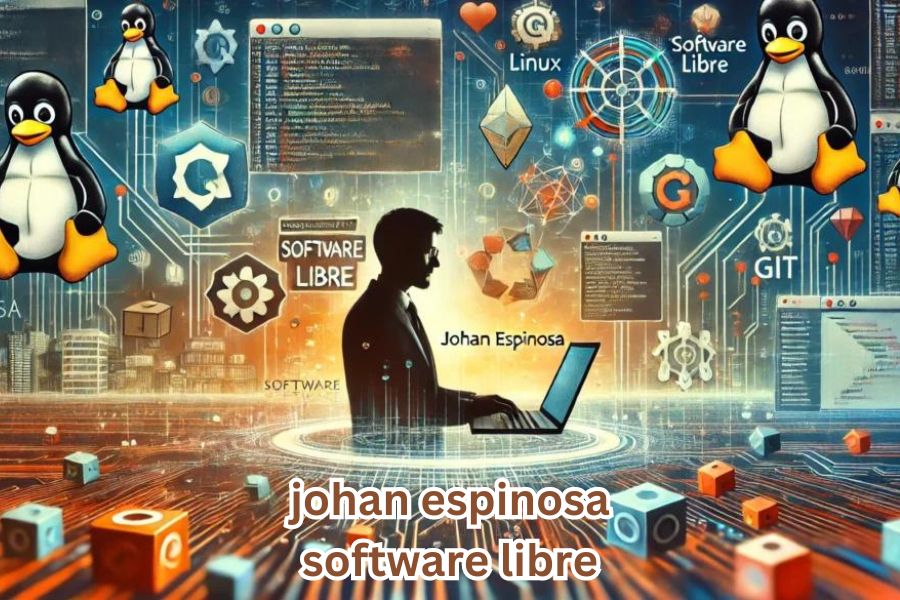In the rapidly changing world of technology, open-source software is becoming increasingly important. One of the most prominent advocates for this movement is Johan Espinosa. He is a leader in promoting software libre, which gives users more freedom and control over their software. In this article, we will explore who Johan Espinosa is, what software libre means, the real-world applications, and the challenges it faces. We’ll also look at how software libre can shape the future of technology.
Who is Johan Espinosa?

Johan Espinosa is a software engineer and a passionate advocate for software libre. His goal is simple: to empower people with the freedom to use, modify, and share software without being restricted by licenses. Unlike proprietary software, which limits what users can do, software libre offers complete transparency and control. Espinosa’s advocacy has made him a key figure in the movement, especially in Latin America, where he has inspired governments, schools, and businesses to adopt open-source solutions.
Espinosa has not only worked on developing open-source software but has also played a key role in promoting the educational and business benefits of software libre. Through his work, more people have been able to break free from the high costs and limitations of proprietary software.
What is Software Libre?
Software libre (free software) aims to give its users four essential liberties:
- Feeling empowered to use software for whatever reason.
- Students and researchers have the freedom to investigate how software operates and modify it accordingly.
- Software that gives us freedom.
- The freedom to share modified versions with others.
These principles make software libre a powerful tool for innovation, collaboration, and transparency. It’s different from regular open-source software because it emphasizes users’ rights to control and adapt the software to their needs. Johan Espinosa’s work revolves around these fundamental ideas, advocating for people’s control over digital tools.
The Importance of Software Libre in Today’s World
Software libre isn’t just for software developers—it’s a way to give people more control over the technology they use daily. Here are some reasons why software libre is essential:
- Cost-Effective: Since software libre is free, users don’t need to worry about costly licenses, which is especially helpful for schools, small businesses, and non-profits.
- Security: Open-source code allows for quicker identification and fixing of security issues. Users don’t have to wait for a company to issue a fix; they can make changes themselves or rely on the community.
- Customization: Unlike proprietary software, which often can’t be changed, software libre allows users to tailor it to their needs. Businesses with unique requirements that cannot be fulfilled with standard software should carefully consider this solution.
- Encourages Innovation: Because anyone can contribute, software libre encourages innovation from developers worldwide. Community involvement is at the core of every initiative undertaken.
Johan Espinosa’s Contributions to Software Libre
Johan Espinosa has made several key contributions to the world of software libre. His work has not only focused on technical development but also on spreading the philosophy of freedom in software. Here are a few of his contributions:
- Development of Open-Source Tools: Espinosa has worked on creating essential open-source tools that help businesses and individuals reduce their reliance on expensive proprietary software. These tools include customer management systems and other business solutions.
- Advocating for Government Adoption: Espinosa has been influential in getting governments, especially in Latin America, to adopt open-source software. This helps governments save money, improve security, and control their data without being tied to multinational corporations.
- Promoting Education: Espinosa believes that educational institutions should use free software. This gives students the ability to learn not just how to use software but how it works. Schools that adopt software libre can save money on licenses and provide a better learning environment where students can tinker and innovate.
Read more: Robert-ponsar-three-deaths
Real-World Applications of Software Libre
Software libre is being used in many real-world settings, showing its broad impact across various sectors:
- Government: Several governments have adopted software libre to gain independence from foreign software providers. In countries like Ecuador, Venezuela, and Colombia, Espinosa’s advocacy has led to public institutions switching to open-source solutions, reducing costs, and increasing transparency.
- Education: Schools and universities worldwide are using software libre to offer students high-quality tools without the expensive licensing fees of proprietary software. It also allows students to learn by exploring and modifying the code, which fosters a deeper understanding of technology.
- Small Businesses: One of the main advantages of software libre for small businesses is its low costs. Espinosa has worked to make open-source business software accessible to small enterprises. This helps companies to reduce operational costs, allowing them to grow and innovate more efficiently.
- Startups: Startups benefit from software libre because it will enable them to innovate quickly without enormous initial costs. They can customize the software to their needs and make changes as they grow, which is vital in a fast-moving business environment.
Challenges Facing Software Libre
Despite its many advantages, software libre faces several challenges that slow down its adoption:
- Adoption Barriers: Many people and organizations are still hesitant to be more confident to switch to software libre due to a lack of familiarity. Proprietary software is often seen as more user-friendly, and users may find the transition difficult.
- Funding: Many open-source projects rely on community donations, which can limit the development and support they can offer. This can make it harder for some projects to gain traction.
- Compatibility Issues: Software libre may face compatibility problems with proprietary software or hardware. This can pose a significant barrier, especially for businesses that rely on specific tools.
- Support and Maintenance: Proprietary software often provides professional support and maintenance services. With software libre, users sometimes need to rely on community support, which may only sometimes be as reliable or fast.
The Future of Software Libre
The future of software libre looks bright, thanks to the growing concerns about data privacy, security, and the need for more control over technology. Advocates like Johan Espinosa continue pushing for a world where software is accessible, secure, and free from corporate control.
As more companies and governments realize the value of open-source solutions, the demand for software libre will likely grow. The movement is not just about technology but about creating a more transparent, ethical, and innovative digital world.
Conclusion
Johan Espinosa’s contributions to the software libre movement have helped shape a future where technology is more accessible to everyone. His work in promoting the freedom to use, modify, and distribute software has made a lasting impact on governments, schools, and businesses worldwide. By focusing on collaboration, transparency, and user control, Espinosa is paving the way for a future where technology is truly in the hands of its users.
As software libre continues to grow, it will face challenges. Still, with the support of passionate advocates like Espinosa, it is poised to revolutionize how we think about and use software. The future of technology belongs to everyone, and software libre is a vital part of that future.
F.A.Q.s
Q: What is the difference between software libre and open-source software?
A: Software libre emphasizes the user’s freedom to modify and share software, while open-source focuses more on making the source code available.
Q: How has Johan Espinosa contributed to the software libre?
A: Espinosa has contributed by developing open-source tools, promoting government adoption, and advocating for software libre in education and business sectors.
Q: Why should businesses consider using software libre?
A: Software libre is cost-effective, secure, and customizable, making it an excellent choice for businesses that want flexibility without the high cost of licenses.
Q: What are the challenges of adopting free software?
A; Some challenges include adoption barriers, funding limitations, compatibility issues, and the need for reliable support.
Q: How can I get involved in the software libre community?
A: You can contribute by using, modifying, and sharing software libre, as well as joining open-source projects and online forums.
Get latest update on DiscoverEssential
